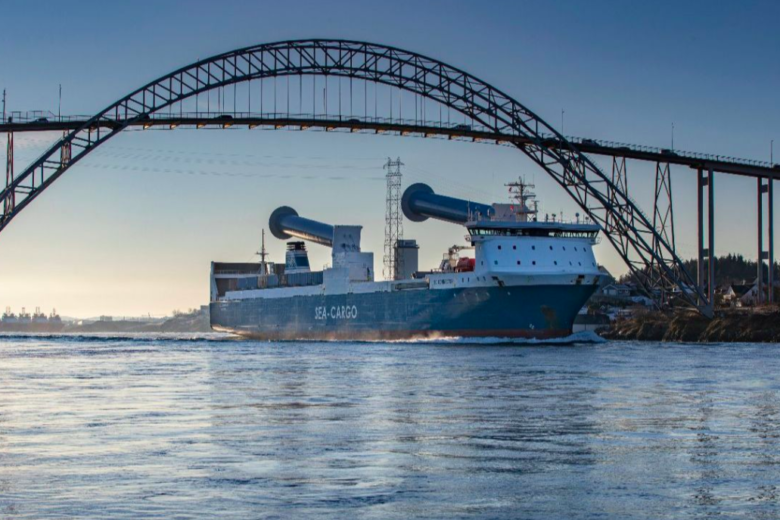35m tiltable rotor sails installed on Sea-Cargo ro-ro
Norsepower has successfully installed two 35m tall rotor sails for Sea-Cargo, a logistics provider in the North Sea market. This installation is said to be the world’s first tiltable rotor sail, showcasing that vessels that have to negotiate height restricted routes can benefit from this fuel and emissions-saving solution. The system is fully automated and detects whenever the wind is strong enough to deliver fuel and emissions savings, at which point the rotor sails start automatically.
According to the analysis conducted by Norsepower and Sea-Cargo, the installation – on board the SC Connector, a 12,251 gross tonne (GT) sidedoor Ro-Ro – can achieve a fuel consumption, fuel cost and carbon emissions reduction of up to 25%. In good wind conditions, the sailing vessel will maintain regular service speed by sail alone.
As shipping transitions towards decarbonisation and meeting IMO’s targets of 2030 and 2050, the maritime transport industry is looking for proven solutions to ensure emissions reductions. Harnessing wind is a natural step to reducing emissions and fuel consumption. Norsepower’s rotor sail solution is a modernised version of the Flettner rotor, a spinning cylinder that uses the Magnus effect to harness wind power to thrust a ship.
SC Connector, which sails between Western Norway, Denmark, the Netherlands and, also, Sweden and Poland, transits under multiple bridges and powerlines, requiring adaptation of the rotor sails to tilt to almost horizontal when required.
“Completing the installation has been extremely rewarding, as it reflects how, in taking a collaborative approach with a customer, we can innovate to create solutions that allow rotor sails to benefit almost any vessel type or trading route,” says Tuomas Riski, CEO, Norsepower. “As we get closer to 2030 IMO targets, we are seeing our technology gaining momentum – with the market seeing the flexibility we can provide to suit different vessel requirements. This installation demonstrates the technology can go a long way to future-proofing IMO GHG compliance, while ensuring significant emissions, and fuel reductions to a variety of vessel profiles today.”
“We are focussing on utilising available renewable energy and using it for direct propulsion to design more environmentally friendly vessels,” says Ole Sævild, Sea-Cargo MD. “The rotor sail technology has been proven in the market for a while, but the size is unique for our project. The sails are far more efficient than conventional sails of the same size and the tilting function is essential to our voyage routes. Given the estimated emissions savings, we will use our experience of this full scale project, and proceed to develop it further for other vessels in our fleet.”
Source: Marine industry news

